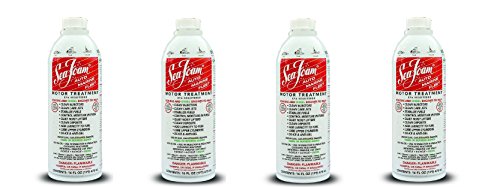Price
Sure, based on the original title SEAFOAM MOTOR TRTMNT16OZ, a refined and simplified version would be: SEAFOAM MOTOR TREATMENT 16OZ
The treatment of fuel additives is a crucial aspect of ensuring the efficient and reliable operation of modern engines. Fuel additives are chemical compounds that are added to fuel to enhance its performance, improve engine efficiency, and reduce emissions. These additives can have a significant impact on the overall performance and longevity of an engine.
One of the primary functions of fuel additives is to improve the combustion process. Additives can help to increase the fuel's ignition quality, leading to a more complete and efficient combustion. This results in increased power output, improved fuel economy, and reduced emissions. Additives can also help to clean and lubricate the fuel system, preventing the buildup of deposits and wear on critical components.
Another important role of fuel additives is to protect the engine from the harmful effects of contaminants and impurities in the fuel. Fuels, particularly those derived from crude oil, can contain various impurities such as water, sediment, and gum. These impurities can lead to the formation of deposits, corrosion, and other issues that can ultimately damage the engine. Fuel additives can help to remove and prevent the buildup of these contaminants, ensuring the engine operates at peak performance.
In addition to improving combustion and protecting the engine, fuel additives can also play a role in reducing emissions. Certain additives can help to reduce the formation of harmful pollutants, such as nitrogen oxides (NOx), carbon monoxide (CO), and particulate matter (PM). This is particularly important in the context of increasingly stringent environmental regulations and the growing emphasis on sustainable transportation solutions.
The selection and use of fuel additives can vary depending on the specific requirements of the engine and the operating environment. Some additives are designed for use in gasoline engines, while others are formulated for diesel engines. Additionally, there are specialized additives that are tailored to address specific issues, such as cold weather performance, fuel stability, or the prevention of fuel system corrosion.
To ensure the effective and appropriate use of fuel additives, it is important to follow the recommendations and guidelines provided by the engine manufacturer or the fuel additive manufacturer. Improper use or the use of incompatible additives can lead to negative consequences, such as reduced engine performance, increased emissions, or even damage to the engine.
In conclusion, the treatment of fuel additives is a crucial aspect of maintaining the performance and longevity of modern engines. By understanding the role and benefits of fuel additives, vehicle owners and operators can make informed decisions about the use of these products and ensure their engines operate at their best.
product information:
| Attribute | Value | ||||
|---|---|---|---|---|---|
| manufacturer | Sea Foam | ||||
| part_number | SF-16 | ||||
| item_weight | 10 pounds | ||||
| product_dimensions | 28 x 2.8 x 7 inches | ||||
| is_discontinued_by_manufacturer | No | ||||
| item_package_quantity | 10 | ||||
| batteries_included | No | ||||
| batteries_required | No | ||||
| customer_reviews |
| ||||
| best_sellers_rank | #5,996,353 in Automotive (See Top 100 in Automotive) #721 in Engine & Oil Fluid Additives | ||||
| date_first_available | May 23, 2015 |













